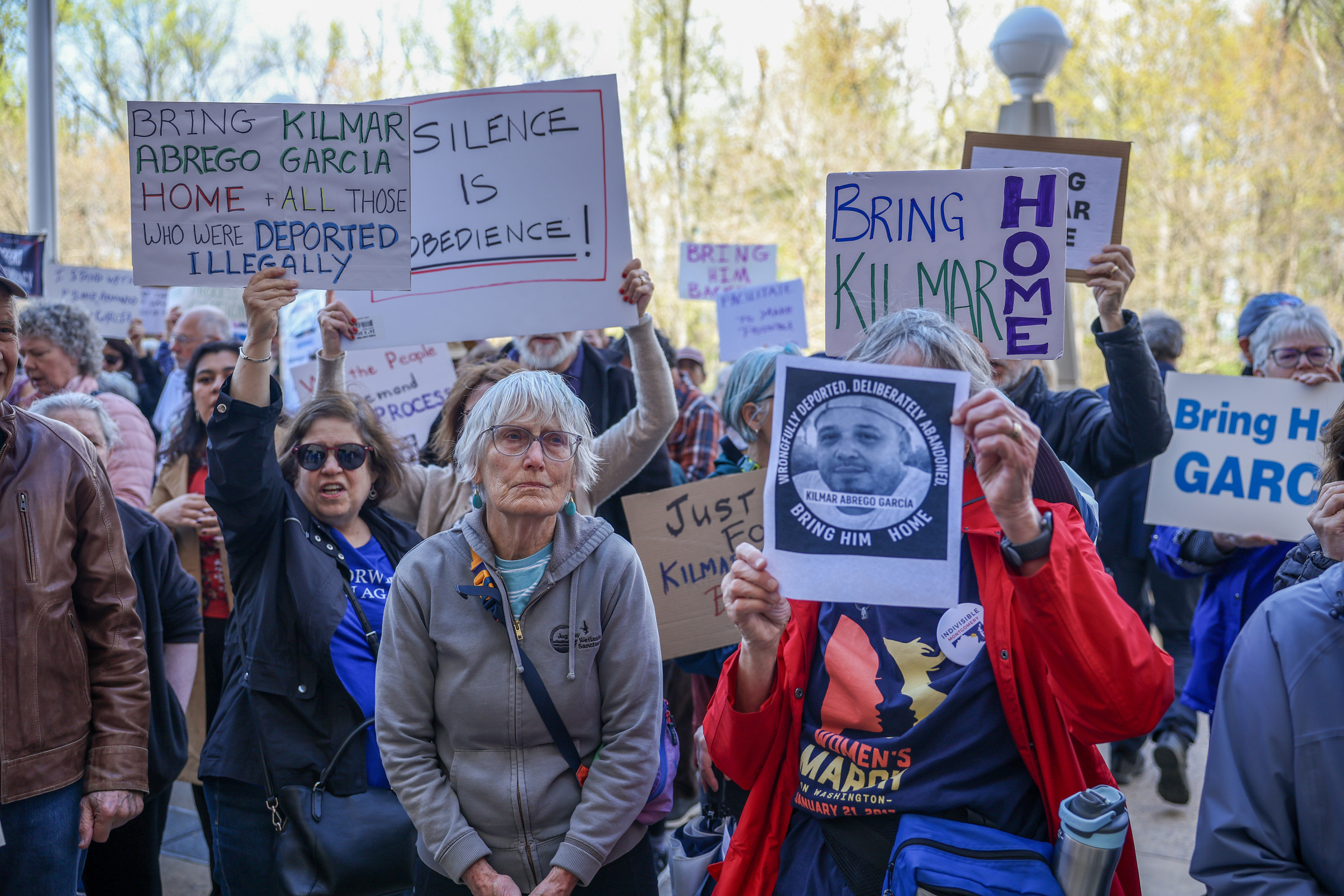Facilitate vs. Effectuate: 10-Letter Words at Core of Constitutional Crisis

When the United States Supreme Court ruled unanimously that the Trump administration needed to "facilitate" the return of a mistakenly deported Salvadoran man, it was seen as a victory, seemingly by both sides.While attorneys for the longtime Maryland resident and a U.S. District Court judge said this meant the White House needed to make efforts to retrieve him from El Salvador's CECOT prison, the administration has said the decision does not force them to do so."The Supreme Court made their ruling last night very clear that it's the administration's responsibility to facilitate the return, not to effectuate the return," White House Press Secretary Karoline Leavitt told reporters Friday. Protesters show support for Jennifer Vasquez Sura, the wife of Kilmar Abrego Garcia, who was mistakenly deported to El Salvador, at Federal Court on April 15, 2025 in Greenbelt, Maryland. Tasos Katopodis/Getty Images What Is The Difference?The Supreme Court was ruling on a petition filed by the Trump administration, asking for U.S District Court Judge Paula Xinis' ruling last week to be overturned. That order said the administration had to "facilitate and effectuate the return of [Abrego Garcia] to the United States by no later than 11:59 PM on Monday, April 7."When Chief Justice John Roberts and the other eight justices issued their ruling, they said the government had to facilitate Abrego Garcia's "release from custody in El Salvador and to ensure that his case is handled as it would have been had he not been improperly sent to El Salvador." They questioned the use of "effectuate" and whether the lower court was overstepping its authority.The Merriam-Webster Dictionary defines "facilitate" as: "To make something easier," to "help bring something about" or "to help something, such as a discussion, run more smoothly and effectively. "Effectuate" is defined as: "to cause or bring about" or "to put something into effect or operation," seemingly a clearer directive.The subtle differences are causing tension between the courts, the government and Abrego Garcia's attorneys."The Supreme Court left the interpretive door open," Herschel Nachlis, associate director of the Nelson A. Rockefeller Center for Public Policy and the Social Sciences at Dartmouth, told Newsweek. "The Trump administration in some sense called the Court's bluff."Trump Administration's View Attorney General Pam Bondi (right) and Secretary of State Marco Rubio (second from right) sit nearby as President Donald Trump meets with President Nayib Bukele (left) of El Salvador in the Oval Office of the... Win McNamee/Getty Images In a filing on April 8, before the Supreme Court's ruling, Solicitor General Counsel of Record D. John Sauer wrote that Xinis' use of "effectuate" meant the government had to return Abrego Garcia to the U.S.—something it could not do."Abrego Garcia is a citizen of El Salvador being detained in El Salvador by the government of El Salvador," Sauer said. "To demand Abrego Garcia's return is thus to demand that a foreign nation release one of its own citizens from one of its own detention centers and return him to the United States."After Thursday's Supreme Court ruling, Xinis clarified her order, requiring the government to take "all available steps" to facilitate Abrego Garcia's return."To this end, the Court hereby amends the Order to DIRECT that Defendants take all available steps to facilitate the return of Abrego Garcia to the United States as soon as possible," Xinis wrote on April 10.The issue of sovereignty and jurisdiction has been raised time and again by the Trump administration. During Monday's Oval Office briefing with President Donald Trump and El Salvadoran President Nayib Bukele, White House officials said the deported man was now Bukele's responsibility."First and foremost, he was illegally in our country, he had been illegally in our country," Attorney General Pam Bondi said during the meeting. "Right now, additional paperwork had needed to be done, that's up to El Salvador if they want to return him."Bondi said the U.S. could provide a plane to bring back Abrego Garcia, if he was released from CECOT."The government put him there. They can get him out," Bennett Gershman, a law professor at Pace University, told Newsweek. "They're paying [El] Salvador millions of dollars to hold U.S. deportees. To suggest Trump lacks the power to bring him home is preposterous. The Supreme Court ordered him to facilitate Garcia's release. That means To Make it Happen!!"However, in the Oval Office on Monday, Secretary of State Marco Rubio made clear the administration's view, saying: "The foreign policy of the United States is conducted by the president of the United States, not by a court."District Court, Attorneys Take Different View Jennifer Vasquez Sura, the wife of Kilmar Abrego Garcia, who was mistakenly deported to El Salvador, speaks to the media before she enters Federal Court on April 15, 2025, in Greenbelt, Maryland. Tasos Katopodis/Getty Images "There is no evidence that anyone has requested the release of Abrego Garcia," his attorneys wrote in a filing on Monday.Despite Xinis' request for daily updates on what has been done to facilitate Abrego Garcia's return, the Department of Justice has said only that he is alive and secure in CECOT, and referred to the Oval Office meeting.Xinis has been critical of the government's minimal updates and referred to various cases in which the Department of Homeland Security (DHS) had facilitated the return of wrongly deported individuals, including U.S. citizens, something Trump administration officials appear reluctant to do because of the word "facilitate.""Trump and his representatives are behaving as if they want to stage a showdown with the Supreme Court. This will not end well," Gershman said.Nachlis also told Newsweek that the conflict could mean the Supreme Court has to get involved again."When it does, the Court will have had more time to study and potentially hear a more fully briefed case, and it could end up clarifying distinctions between things like 'facilitate' and 'effectuate,'" he said. "The next time this ends up at the Supreme Court, the Court may also be forced to clarify some key questions about executive branch power over these issues."When the Supreme Court issued its decision last week, it placed emphasis on Abrego Garcia being given the due process to argue his case in court, which he was denied in mid-March when he was swept up by DHS agents and taken out of Maryland to an ICE detention facility in the South.While an administrative error put him on a removal flight, the executive branch—the White House—has been clear in its view: Abrego Garcia entered the U.S. illegally, he faced a final order of removal, and he is a member of MS-13, giving them the authority to make the decision."Tension over which branch has interpretive supremacy on hot-button political issues is woven into our Constitutional structure and political history," Nachlis said.A judge in 2019 ruled Abrego Garcia could be deported, but it was also ruled that he could not be sent back to El Salvador because of fears of persecution, effectively protecting him from removal. The only evidence of gang membership was a local police report, based off an anonymous tip and descriptions of the sports team clothing he wore.MS-13 was designated a Foreign Terrorist Organization by the Trump administration, and Abrego Garcia's alleged ties are now being used as reasoning for his swift departure to CECOT.In a Tuesday court filing, the administration also said that if he returned to the U.S. at an official port of entry, he would be detained by DHS and deported to a third country because of the alleged gang links.Abrego Garcia's attorneys and Xinis don't feel this view stacks up, with the latter telling Trump administration representatives Tuesday that she felt their definition of "facilitate" flies in the face of the plain meaning of the word."When a wrongfully removed individual [is outside U.S. borders] it's not so cut-and-dried that all you have to do is remove obstacles domestically," she said, while also seemingly admonishing the administration for not adhering to what the land's highest court ordered.The judge said she was willing to move quickly to come to a decision but needs to hear more from the administration on its reasoning and actions.For now, it appears that the U.S. and El Salvador are not willing to make a move on releasing Abrego Garcia from CECOT, let alone facilitate or effectuate his return to the U.S.


